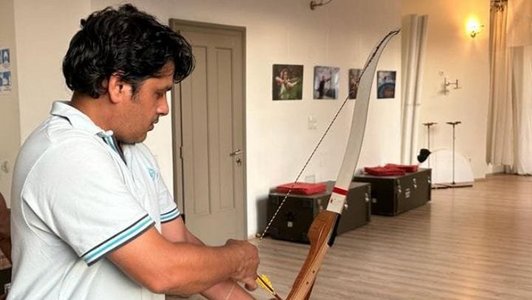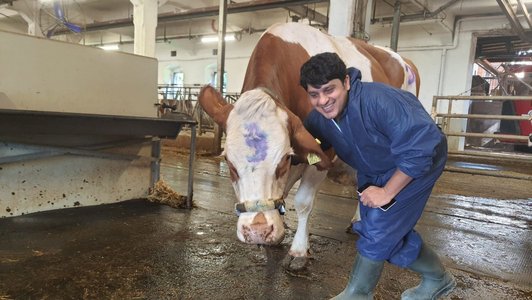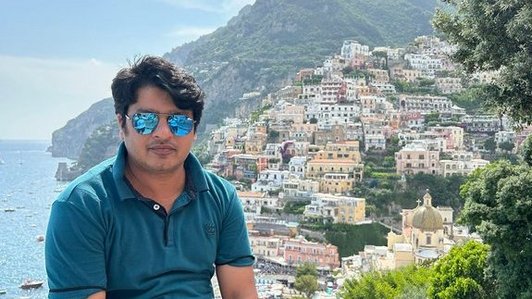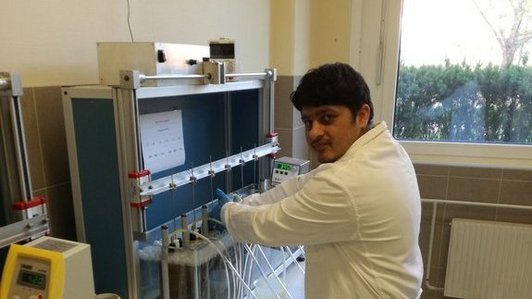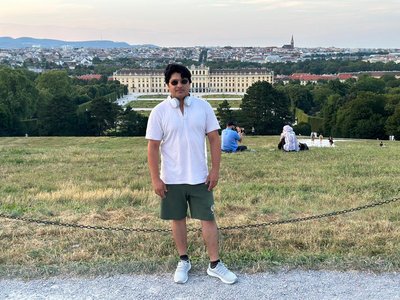

I am Dr. Mubarik Mahmood, working as an Assistant Professor in Animal Nutrition at the University of Veterinary and Animal Sciences (UVAS) in Lahore, Pakistan. I am currently engaged in teaching and research related activities. I completed my doctoral studies in 2020 at the University of Veterinary Medicine (VetmedUni) in Vienna at the Institute of Animal Nutrition and Functional Plant Compounds under the supervision of Prof. Dr. Qendrim Zebeli. I am a proud Higher Education Commission Pakistan (HEC) OeAD alumnus, and my area of research is to explore the potential of various dietary components and feed additives in dairy cattle, particularly focusing on ruminal microbiota and fermentation characteristics.
Networking opportunities through the scholarship
My stay at VetmedUni benefited me in various aspects. It not only enabled me to acquire in-depth professional knowledge and practical skills, but also developed my personality with regard to problem solving abilities and critical thinking. The multi-cultural environment improved my communication skills, and the availability of tremendous networking opportunities provided me chances to meet mentors and field experts both from the government and private sectors. The benefits of such connections were manifested after completing my studies, as I was able to secure different international and collaborative research grants as Principal Investigator or Project Coordinator, from both government and private sectors. I hope I can continue to collaborate more in the future, both nationally and internationally, with the possible involvement of private and government sectors for achieving my goal of establishing a state-of-the-art research laboratory in Pakistan, equipped with a range of in vitro research models for animals.
In addition to my academic stay, I embraced Austrian culture. The experiences of learning archery, boating, and table tennis in addition to going to the cinema created lots of fun. I have made new friends and enjoyed Austrian food and beverages, particularly Austrian coffee, during social meetups in Vienna. I also explored other cities and villages in Austria. Furthermore, I often encountered some funny situations. Once, I was very hungry and was rushing to my apartment. I took the train from Floridsdorf to Praterstern, but it moved in the opposite direction. I then realized that I took the train in the wrong direction. I sat there whispering: “Please stop, stop, stop!”, but the cruel train only stopped earliest in some other province of Austria. On that day I felt that it is not only food which can finish one’s hunger. On another occasion, I lost my apartment keys, and it took me a few days to get new ones. I realized then that it is not a problem when one does not take a shower for a few days.
Facilitating mobility between Pakistan and Austria
In the future, I want to strive to facilitate the mobility and research facilities of Pakistani researchers and wish for my home university UVAS to be part of ASEA-UNINET to upgrade the personal and professional expertise of our researchers. I recommend upcoming and current HEC scholars to learn the maximum at their workplace in addition to completing their studies. They should express themselves, build relations, and immerse themselves in Austrian culture, food, language, and sports. Finally, do not lose the keys to your apartment and/or institute, and always confirm the directions of trains before boarding.
I would like to express my love for OeAD, HEC, UVAS, VetmedUni, BOKU, Biomin GmbH, AGRANA Sales & Marketing GmbH, and ARASS, who have made my journey from starting my studies to securing research projects successful. I would like to say thanks to all of the people who helped, directed, motivated and supervised me during this journey, including Prof. Dr. Qendrim Zebeli, Dr. Ratchaneewan Khiaosa-Ard, Prof. Dr. Talat Naseer Pasha, Ms. Martina Rahberger, Dr. Zafar Ullah Khan, Dr. Felipe Penagos Tabares, Mr. Johannes Faas, and Ms. Regina Kamauf.
CV
Dr. Mubarik Mahmood studied Animal Nutrition in Pakistan and Vienna. He came to Austria with a HEC scholarship and received his doctorate in 2020. He now works as an Assistant Professor at the University of Veterinary and Animal Sciences in Lahore, and keeps close contact with the University of Veterinary Medicine in Vienna.
He has worked on various projects within the scope of the Cooperation and Development Scheme, the most recent this summer on Bioresources and Food Engineering. His first project entitled “Determination of multi-mycotoxin contamination levels in Total Mixed Rations (TMR) of dairy farms in Pakistan” was sponsored by Biomin GmbH-Austria and Agri-Food Research & Sustainable Solutions (Private) Limited (ARASS)-Pakistan with a total worth of 13,000 Euros. The second project was entitled “Turning fruit and vegetable wastes into livestock feed: Sustainable feed resources with functional properties”, and was funded by the Austrian Federal Ministry of Education, Science and Research (BMBWF) and OeAD (Cooperation Development Research, KoEF 06/2020) with a total worth of 43,600 Euros. AGRANA Sales & Marketing GmbH, and UVAS Lahore approved other research grants to the equivalent amount of 5,000 and 2,000 euros, respectively, in order to utilize his services as a principal investigator for the projects “Modulation of cecal microbiota and fermentation in response to feeding natural betaine in backyard poultry under tropical climate” and ‘Development of Android Application for Least Cost Feed Formulation using Local Feed Resources’.

